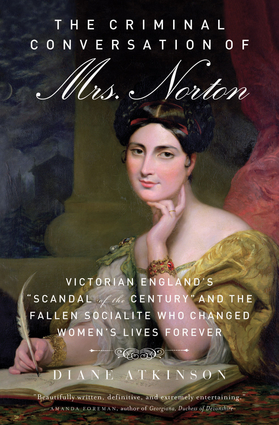Suggested reading from Chicago Review Press
 Mother's Day Mother's Day |
 Father's Day Father's Day |

 |
Victorian England's "Scandal of the Century" and the Fallen Socialite Who Changed Women's Lives Forever
By Diane Atkinson
HISTORY
496 Pages, 6 x 9.125
Formats: Cloth, PDF, EPUB, Mobipocket
Cloth, $29.95 (US $29.95)
ISBN 9781613748800
Rights: US
Chicago Review Press (Sep 2013)
Overview
A forgotten heroine of the women’s rights movement is rescued from obscurity in this biography of Caroline Norton, a respected poet, songwriter, and socialite whose 1836 adultery trial rocked Victorian England. When George Norton accused his wife of having an affair with the British Prime Minister he sparked what was considered “the scandal of the century.” Though she was declared innocent, the humiliated George locked Caroline out of their home, seized her manuscripts, letters, clothes, jewels, and every penny of her earnings, and refused to let her see their three sons. This detailed account of the Norton “criminal conversation” trial sheds vivid light on the desperate position of women in male-dominated Victorian society and chronicles Caroline’s lifelong campaign to establish legal rights for married and divorced women, allowing them to inherit property, take court action on their own behalf, and in effect establishing them for the first time as full-fledged human beings before the law. Figuring into this fascinating story are Norton’s friend and confidante Mary Shelley, longtime admirer Charles Dickens, Lord Byron, Queen Victoria, and other literary and royal heavyweights of the day.
Reviews
"Lively, entertaining, and filled with rivetingly weird details. . . . Atkinson's book pays tribute to a neglected heroine." —Sunday TimesAuthor Biography
Diane Atkinson holds a PhD on the politics of women’s labor. She has worked as a lecturer and curator specializing in women’s history at the Museum of London. She is the author of Elsie and Mairi Go to War, Funny Girls: Cartooning for Equality, Love and Dirt: The Marriage of Arthur Munby and Hannah Cullwick, and Suffragettes in Pictures.